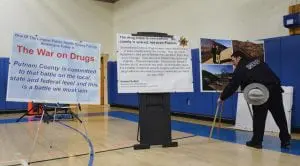Kudos and appreciation to The Highlands Current and reporter Liz Schevtchuk Armstrong for her thorough and thoughtful account of the Garrison School Board’s opioid roundtable on March 28 (In Drug Epidemic, Looking for Answers, March 31). While the event attracted a large crowd by school-board meeting standards, it is so important that the content of our discussions, the concerns expressed by the audience and insights and opinions of our expert panel reach the broader Philipstown community.
Thanks also to those parents and other community members who joined us to ask questions and share their experiences, in several cases as family members of victims of the opioid scourge. I suspect our panelists, who battle the epidemic from the trenches every day, were heartened by the showing of support and engagement.
Most important, we are indebted to our panelists, who gave generously of their insights, experiences and opinions. If there was one key takeaway from our discussion, it is that the opioid scourge presents an infinitely complex societal challenge that must be fought simultaneously across many and varied fronts. Our best hope is to remain committed and to work cooperatively as parents, teachers, service providers and at every level of government.
Raymond O’Rourke, Garrison
O’Rourke is president of the Garrison School Board.
It was generous of our panel of local officials to give up an evening to tell worried parents what we can do in the Hudson Valley to reduce the threat of the opioid/heroin epidemic, but I left the meeting wanting to know (and do) more. If ever there was a national problem that requires a forthright response from conscientious leaders, this is it.
Deaths from prescription opioids have quadrupled since 1999. A glance at the opioid statistics reveals, rather shockingly, that the amount of prescription opioids sold in the U.S. has also quadrupled since 1999 even though there’s been no change in the amount of pain that Americans report.
To President Trump, it’s all about Mexican drug lords. This is what he said a few days ago: “Drug cartels have spread their deadly industry across our nation, and the availability of cheap narcotics, some of it comes in cheaper than candy and has devastated our communities.”

But the drug lords aren’t the ones spending billions of dollars to quadruple the prescription of opioids for whatever ails you. Big Pharma, with its war chest in the billions and its unrivaled political clout, does that. Their lobbyists get legislators to turn a blind eye while their marketing geniuses gin up demand. Now, legal opioid use and opiate deaths are both at an all-time high.
Of course, when addicts can no longer afford opiates or when prescriptions run out, they turn to cheap heroin, much of which does come across the Mexican border. Trump’s answer is we need “a great wall along our southern border” to stop drugs from flowing in at an “unprecedented rate.” That will cost about $26 billion, but contrary to what Trump claims, it won’t stop heroin from coming in. Law enforcement experts well know that most heroin comes in through legal crossing points, in trucks, cars, clothing and even, I imagine, birthday piñatas. So that costly border wall will do nothing to protect our children from opioid or heroin addiction.
Trump obviously doesn’t know what he’s talking about, but here’s the saddest part: when he campaigned for president, Trump made lots of promises, especially to communities where opioid addiction is worst, that he would spend whatever it takes to help addicts get healthy again. Instead, his 2018 budget proposes to cut 16 percent of funding from the Department of Health and Human services, which funds programs for opioid addicts. And his proposed replacement for Obamacare would have left about 3 million Americans without the addiction treatment they need to get better.
Trump makes it easy to dismiss him. But that’s not enough. If we’re to bring down the death toll from opioids and heroin, we’ll need to insist on leadership willing to tell the truth about this awful scourge and then to mobilize the public against those who are responsible for it.
David Gelber, Garrison
Gelber is a trustee on the Garrison School Board.

